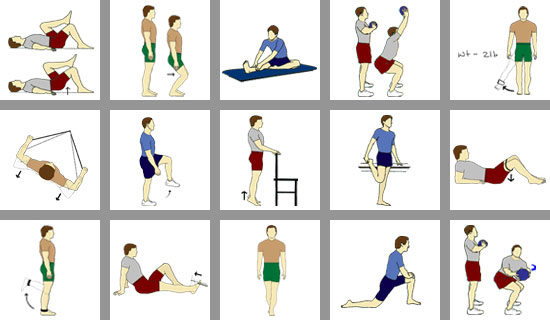Exercise is an activity to develop the body and mind, a task to be practiced for improving a skill. Everyone can always improve the physical and mental activities of their life with effort.
The physical and mental effects of a traumatic brain injury are overwhelming, yet better health with exercise can be rewarding, freeing a person from their limitations.

After rehabilitation at the hospital, I exercised for more than two years at the community college, stopping because I was pleased with my progress, and continued to exercise at home.
A few years later my physical therapist recommended I return to the gym to improve strength, it wasn’t coming back naturally like I thought it would.
I once spent a couple of months focused on exercises to improving my balance and saw some progress. Then I focused on strength exercises for some time and when I returned to working on my balance I didn’t do well. It’s as if my body and mind forgot the progress I made.
I find that consistency is more important than the amount of time or energy I spend exercising. One of the benefits of the gym is that you can do several exercises in one visit. Unfortunately, when I’m improving with an exercise I want to do more and it’s difficult to think of other exercises.
The first thing I need for any exercise is a good night sleep so I can focus on the workout and shut out the noise around me. To help me sleep I wear ear plugs, take a melatonin tablet, use a spray on my tongue called rescue sleep made by Bach® (a homeopathic), sometimes I use an eye cover and/ or eat half a banana and I always have a white noise machine playing the sound of the ocean on a beach.
Sleep will reduce the distractive tingling sensation I feel in my thighs caused by nerve damage, which will allow me to concentrate better. I also rub arnica (a homeopathic) on my hamstrings (back of thigh) every day.
Good sleep will delay the instability of my knee, which will result with hyperextension (the knee snaps backwards), This becomes worse in the evening when I’m tired. I also wear a knee brace and carry a cane to keep myself steady when I leave the house.
With good sleep I avoid the stiffness and poor coordination caused by spasticity. Spasticity is damage to the central nervous system resulting in the uncontrolled tightening of muscles, it becomes difficult to walk and be agile. I believe stretching my legs and arms everyday has improved the flexibility.
Be safe, use supports that will hold your weight (towel racks are not secure). I found I could do more exercises if I support myself with something. I hold on to a handicap railing when I do squats, I rest my wrist on a hand rail and slide it along when I do heel-toe walking and I hold on to the door frame when I balance on one foot.
The physical and mental effects of a traumatic brain injury are overwhelming, yet better health with exercise can be rewarding, freeing a person from their limitations.

After rehabilitation at the hospital, I exercised for more than two years at the community college, stopping because I was pleased with my progress, and continued to exercise at home.
A few years later my physical therapist recommended I return to the gym to improve strength, it wasn’t coming back naturally like I thought it would.
I once spent a couple of months focused on exercises to improving my balance and saw some progress. Then I focused on strength exercises for some time and when I returned to working on my balance I didn’t do well. It’s as if my body and mind forgot the progress I made.
I find that consistency is more important than the amount of time or energy I spend exercising. One of the benefits of the gym is that you can do several exercises in one visit. Unfortunately, when I’m improving with an exercise I want to do more and it’s difficult to think of other exercises.
The first thing I need for any exercise is a good night sleep so I can focus on the workout and shut out the noise around me. To help me sleep I wear ear plugs, take a melatonin tablet, use a spray on my tongue called rescue sleep made by Bach® (a homeopathic), sometimes I use an eye cover and/ or eat half a banana and I always have a white noise machine playing the sound of the ocean on a beach.
Sleep will reduce the distractive tingling sensation I feel in my thighs caused by nerve damage, which will allow me to concentrate better. I also rub arnica (a homeopathic) on my hamstrings (back of thigh) every day.
Good sleep will delay the instability of my knee, which will result with hyperextension (the knee snaps backwards), This becomes worse in the evening when I’m tired. I also wear a knee brace and carry a cane to keep myself steady when I leave the house.
With good sleep I avoid the stiffness and poor coordination caused by spasticity. Spasticity is damage to the central nervous system resulting in the uncontrolled tightening of muscles, it becomes difficult to walk and be agile. I believe stretching my legs and arms everyday has improved the flexibility.
Be safe, use supports that will hold your weight (towel racks are not secure). I found I could do more exercises if I support myself with something. I hold on to a handicap railing when I do squats, I rest my wrist on a hand rail and slide it along when I do heel-toe walking and I hold on to the door frame when I balance on one foot.


